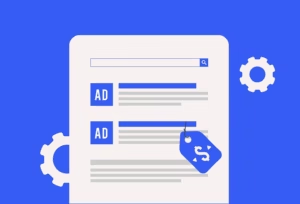In the fast-paced realm of digital marketing, Pay-Per-Click (PPC) advertising has emerged as a powerful tool, particularly in the context of Business-to-Business (B2B) marketing. Unlike traditional advertising models, where businesses pay a fixed fee regardless of performance, PPC empowers advertisers to pay only when their ads are clicked.
This precision-based advertising method has revolutionized the B2B landscape, allowing companies to target specific audiences, generate leads, and ultimately drive revenue with unprecedented efficiency.
The Significance of Optimizing PPC Campaigns
While PPC advertising in the B2B sphere offers immense potential, its effectiveness hinges on optimization – the art of making every click count. In this highly competitive arena, optimizing PPC campaigns isn’t just a strategy; it’s a necessity.
Here’s why:
1. Maximizing Budget Efficiency
Budgets in B2B marketing are often limited, and every dollar spent needs to deliver results. PPC optimization is akin to fine-tuning a powerful engine. It ensures that every click is directed towards the most promising leads, minimizing wastage and maximizing ROI. Without optimization, precious budget resources can be squandered on clicks that don’t convert into meaningful actions, such as sign-ups or sales.
2. Targeting Niche Audiences
In B2B, the audience is often niche and highly specific. PPC optimization allows you to zero in on this elusive target market. Whether you’re targeting decision-makers in a particular industry or seeking out businesses in a certain geographic region, optimization ensures your ads reach the right eyeballs at the right time. This precision minimizes ad spending on irrelevant clicks and increases the likelihood of engaging high-value prospects.
3. Keeping Pace with Competitors
The B2B landscape is fiercely competitive. Your rivals are vying for the same pool of potential customers. To stand out, you need to optimize your PPC campaigns continuously. It’s not just about maintaining the status quo; it’s about outsmarting your competitors by refining your ad copy, selecting the most effective keywords, and bidding strategically. Without optimization, you risk falling behind in the race for B2B customers.
4. Adapting to Evolving Trends
Digital marketing is dynamic, with trends and customer behavior constantly evolving. Optimization enables you to adapt swiftly to these changes. Whether it’s embracing new ad formats, adjusting your bidding strategy, or fine-tuning your targeting parameters, a well-optimized PPC campaign can pivot as needed to stay ahead of the curve.
The Growing Importance of PPC in B2B Marketing
In the ever-evolving landscape of B2B marketing, Pay-Per-Click (PPC) advertising has swiftly risen to prominence, earning its place as a cornerstone of successful digital marketing strategies. What was once primarily associated with B2C marketing has now become an indispensable tool for B2B businesses.
Let’s explore why PPC is on the ascent in B2B marketing and why your company should take notice.
Statistics and Trends
- The Surge in B2B PPC Investment: Over the last decade, B2B companies have been significantly increasing their investment in PPC advertising. According to recent industry reports, B2B PPC ad spending has experienced consistent double-digit growth, with no signs of slowing down.
- Shift from Traditional to Digital: Traditionally, B2B marketing relied heavily on trade shows, print publications, and cold calls. However, the digital age has transformed the landscape. A growing number of B2B decision-makers now turn to online research and networking, making digital advertising channels like PPC a logical choice.
- Social Media Advertising: Social media platforms have also become fertile ground for B2B marketers. LinkedIn, in particular, has emerged as a powerhouse for targeting professionals and businesses, and PPC campaigns on this platform have shown remarkable results.
- Account-Based Marketing (ABM): ABM has gained traction in B2B circles, and PPC aligns perfectly with this strategy. By precisely targeting individual accounts or companies, PPC enables B2B marketers to tailor their messaging and reach decision-makers directly.
The Competitive Landscape of B2B Advertising
In the B2B sphere, competition is fierce, and the battleground is digital. Here’s how the competitive landscape impacts the efficiency of B2B advertising and why PPC has become a game-changer:
- Bid Wars: With limited ad space on search engine results pages (SERPs), B2B advertisers find themselves in bidding wars to secure the top positions. As competition escalates, optimizing PPC campaigns becomes crucial for maintaining a strong ad position without inflating costs.
- Quality Score Matters: Search engines like Google assign Quality Scores to ads based on relevance and click-through rates. In B2B PPC, where ad spend efficiency is paramount, a high-quality Score can translate to lower costs per click and higher ad placements.
- Data-Driven Decision-Making: B2B marketers are leveraging data and analytics to gain a competitive edge. PPC platforms provide a wealth of data on campaign performance, enabling advertisers to fine-tune their strategies continuously.
- Personalization and Targeting: Personalization is no longer a B2C exclusive. B2B advertisers are now harnessing the power of PPC to deliver highly personalized messages to decision-makers, thereby increasing their chances of engagement and conversion.
- Constant Innovation: The competitive landscape encourages innovation. B2B advertisers are exploring new ad formats, automation tools, and AI-driven strategies to maintain an edge in the digital marketing arena.
Challenges in B2B PPC Advertising
While Pay-Per-Click (PPC) advertising holds immense promise in the B2B realm, it doesn’t come without its fair share of challenges. Successful B2B PPC campaigns require a delicate balance of strategy, precision, and adaptability. Let’s delve into some of the key challenges faced by B2B marketers as they navigate the complex world of PPC advertising.
1. Identifying Key Challenges
a. Intense Competition: B2B markets are often highly competitive, with numerous companies vying for the attention of the same target audience. This results in bidding wars, driving up the cost per click (CPC) and making it challenging to maintain a profitable campaign.
b. Complex Sales Cycles: B2B sales cycles are typically longer and more complex than those in the B2C space. This means that tracking conversions and attributing them to specific keywords or ads can be challenging. Marketers often need to look beyond immediate results and consider the entire customer journey.
c. Highly Niche Audiences: B2B products or services often cater to very specific industries or job roles. Reaching these niche audiences can be tricky, as they may not always use common search terms. Identifying the right keywords and search queries is crucial.
d. Budget Constraints: B2B marketers frequently operate with limited budgets. Allocating these resources effectively to maximize ROI can be a daunting task, especially when there’s pressure to compete in crowded markets.
e. Content and Messaging: Crafting compelling ad copy and landing page content that resonates with B2B audiences can be a challenge. B2B buyers are often looking for detailed information, making content creation a critical aspect of PPC success.
f. Data Analysis and Optimization: PPC campaigns generate vast amounts of data, from click-through rates to conversion rates. Analyzing this data and making informed decisions for campaign optimization can be overwhelming without the right tools and expertise.
The Dual Challenge of Limited Budgets and Niche Audiences
One of the most pressing challenges in B2B PPC advertising is the intersection of limited budgets and niche audiences. Here’s why this dual challenge is so critical:
a. Limited Budgets: B2B companies often operate with finite advertising budgets, which need to be carefully allocated across various marketing channels. PPC campaigns must deliver tangible results within these budget constraints, making every click count.
b. Niche Audiences: B2B audiences are highly specialized. You’re not targeting millions of consumers; you’re targeting a select group of professionals or businesses. This means that the pool of potential customers is smaller, and the keywords or search queries used may be more specific and less common.
c. Balancing Act: B2B marketers must strike a delicate balance between targeting a narrow, niche audience and achieving a cost-effective CPC. Focusing solely on the most niche keywords might lead to extremely high costs, while casting too wide a net may result in irrelevant clicks and wasted budget.
In the world of B2B advertising, Pay-Per-Click (PPC) software emerges as the strategic linchpin that empowers marketers to harness the full potential of their campaigns. Before we delve into the substantial benefits PPC software offers, let’s establish what PPC software is and its pivotal role in B2B ad campaigns.
What is PPC Software?
PPC software, in its essence, is a suite of digital tools designed to streamline and optimize every facet of a PPC campaign. It’s the digital marketer’s Swiss Army knife, a comprehensive solution that simplifies the complexities of managing PPC advertisements. These software platforms are equipped with an array of features, ranging from keyword research and bid management to ad creation and performance tracking.
The Role of PPC Software in B2B Ad Campaigns
PPC software serves as the backbone of B2B ad campaigns, offering several pivotal functions:
- Efficiency Enhancement: PPC software enhances the efficiency of campaign management by automating time-consuming tasks. This frees up valuable resources, enabling marketing teams to focus on strategy and creativity.
- Data-Driven Decision-Making: It empowers marketers with data-driven insights, helping them make informed decisions to optimize campaigns continuously. Data analysis and real-time feedback are instrumental in achieving campaign success.
- Ad Targeting Refinement: B2B audiences are specific and nuanced. PPC software assists in fine-tuning ad targeting, ensuring that your ads reach the most relevant prospects, which is essential for maximizing ROI.
- Cost Control: With budget constraints always looming, PPC software aids in efficient budget allocation and optimization, reducing wasted ad spend and making every dollar count.
Now, let’s delve into the time-saving and cost-saving benefits that PPC software brings to the table.
Time-Saving Benefits of PPC Software
Managing PPC campaigns can be a meticulous and time-consuming endeavor. PPC software steps in as your tireless assistant, automating various aspects of campaign management:
1. Keyword Research and Management: PPC software simplifies the process of discovering high-performing keywords. Automated keyword research tools provide insights into which keywords are most relevant and have the potential to drive conversions. Additionally, the software can assist in ongoing keyword management, ensuring your campaigns stay aligned with changing search trends.
2. Ad Creation and Optimization: Crafting compelling ad copy is a crucial part of PPC success. PPC software often includes ad creation and optimization tools that help generate ad copy variations and test their performance to identify the most effective ones.
3. Bid Management and Budget Allocation: Real-time bid management is critical in competitive environments. PPC software employs algorithms to adjust bids based on performance data, ensuring you’re not overspending for clicks while still maintaining ad visibility. This automated process also simplifies budget allocation, helping you allocate resources to the most profitable campaigns or keywords.
4. Case Studies and Real-World Examples: To illustrate the time-saving benefits of PPC software, we’ll delve into real-world case studies. These examples will demonstrate how businesses have reduced the time spent on campaign management tasks while achieving better results through the automation capabilities of PPC software.
Cost-Saving Benefits of PPC Software
While saving time is paramount, cost efficiency is equally vital in B2B PPC advertising. Here’s how PPC software contributes to significant cost savings:
1. Ad Fraud Prevention: Click fraud is a prevalent issue in PPC advertising, leading to wasted ad spend. PPC software often incorporates fraud detection mechanisms that identify and block fraudulent clicks, preserving your budget for genuine prospects.
2. A/B Testing for Ad Performance: Testing different ad variations to determine which ones resonate best with your audience is essential. PPC software streamlines A/B testing, allowing you to iterate ad creatives and optimize for conversions efficiently.
3. Effective Campaign Tracking and Analytics: Understanding campaign performance is the key to efficient budget allocation. PPC software provides comprehensive tracking and analytics tools that help you identify underperforming campaigns or keywords and reallocate resources to those that deliver a better ROI.
4. Data-Driven Cost Savings: To showcase the cost-saving prowess of PPC software, we’ll provide concrete examples of businesses that have substantially reduced their ad spend while simultaneously improving campaign performance. These case studies will emphasize the practical benefits of employing PPC software in B2B advertising.
Implementing PPC Software in B2B Campaigns
So, you’ve recognized the potential of PPC software to revolutionize your B2B advertising campaigns, but how do you go about implementing it effectively? In this section, we’ll explore the essential steps and best practices for seamlessly integrating PPC software into your existing B2B advertising strategies.
Steps for Integrating PPC Software
- Identify Your Goals: Start by defining clear objectives for your PPC campaigns. Whether it’s lead generation, brand awareness, or sales, having well-defined goals will guide your software selection and strategy.
- Select the Right PPC Software: Choose a PPC software solution that aligns with your goals, budget, and the scale of your campaigns. Look for features that address your specific needs, such as bid management, keyword research, or fraud prevention.
- Data Integration: Ensure that your chosen PPC software can seamlessly integrate with your existing marketing tools and platforms, such as CRM systems or analytics tools. Data integration is crucial for a cohesive marketing strategy.
- Keyword Research: Leverage the software’s keyword research capabilities to identify relevant and high-performing keywords for your B2B audience. This step is foundational for creating targeted and effective ad campaigns.
- Ad Creative and Landing Page Optimization: Use the software’s ad creation and optimization tools to refine your ad copy and design. Ensure that your landing pages are optimized for conversions, as this plays a pivotal role in the success of your campaigns.
- Bid Management: Implement automated bid management to optimize your ad spending. Set rules and parameters within the software to adjust bids based on performance data, maximizing ROI while minimizing costs.
- Ad Testing and Optimization: Continuously test different ad variations to discover which ones resonate most with your audience. PPC software often includes A/B testing features to streamline this process.
- Fraud Prevention: Activate the software’s fraud detection mechanisms to protect your budget from click fraud. This feature is essential for maintaining cost efficiency in your campaigns.
- Campaign Tracking and Analytics: Regularly monitor campaign performance through the software’s tracking and analytics tools. Use the data to make informed decisions and refine your strategies for better results.
- Iterate and Refine: PPC software allows for real-time adjustments. Don’t hesitate to iterate and refine your campaigns based on data insights and changes in your goals or market conditions.
Best Practices for Training and Onboarding
- Cross-Team Collaboration: Encourage collaboration between your marketing and IT teams during the software implementation process. IT can help with technical aspects like integration, while marketing brings domain expertise.
- Comprehensive Training: Invest in thorough training for your marketing teams. Ensure that they understand the software’s features and functionalities. Many software providers offer training resources and support.
- Hands-On Experience: Practical experience is invaluable. Encourage your team to actively use the software, experiment with its features, and learn through hands-on experience.
- Regular Updates: Keep your marketing team up-to-date with any software updates or new features. PPC software is continually evolving, and staying informed is crucial for optimizing campaigns.
- Establish Reporting Protocols: Set up clear reporting protocols to ensure that your team tracks the right KPIs and shares insights effectively. Regular reporting helps in decision-making and assessing ROI.
- Feedback Loops: Create a feedback loop where your marketing team can provide input on the software’s usability and effectiveness. This feedback can be valuable for software optimization and customization.
- Continuous Learning: Encourage a culture of continuous learning. The world of PPC and digital marketing is dynamic, and ongoing education is key to staying competitive.
Conclusion
In the rapidly evolving world of B2B PPC advertising, the right tools can make all the difference. We’ve journeyed through the realm of Pay-Per-Click advertising, uncovering its growing importance in B2B marketing, the unique challenges it presents, and the transformative power of PPC software. Now, as we draw this insightful exploration to a close, we’d like to shine a spotlight on a game-changing PPC software solution: Data Bid Machine.
Ready to Elevate Your B2B PPC Campaigns?
The path to B2B PPC excellence starts with Data Bid Machine. If you’re looking to supercharge your campaigns, maximize your ROI, and outperform the competition, it’s time to explore the possibilities that Data Bid Machine offers.
Don’t miss the opportunity to revolutionize your B2B advertising strategies. Whether you’re a seasoned marketer or just dipping your toes into the world of PPC, Data Bid Machine is here to support your journey.
Book a Consultation Call Today
Ready to take the next step towards PPC success? We invite you to book a consultation call with our experts. Our team at Data Bid Machine is dedicated to helping you harness the full potential of PPC advertising in the B2B realm. Let us tailor a solution that meets your unique needs and objectives.




